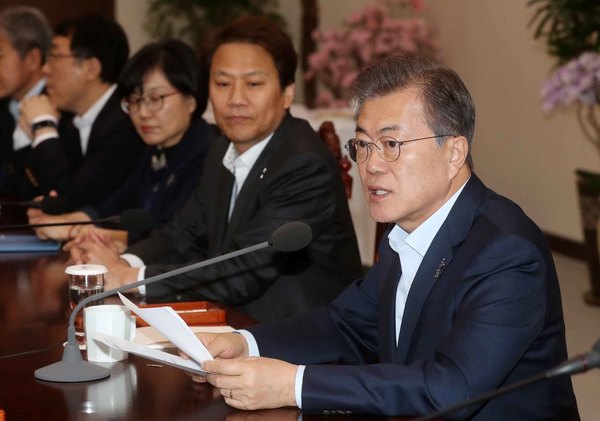 |
|
President Moon Jae-in presides over a meeting with his senior secretaries and aides at the Blue House on Mar. 12. (by Kim Kyung-ho, staff photographer)
|
Path to summits represent “a great historical transformation that the world has yet to succeed in”
President Moon Jae-in seemed cheerier than ever before while presiding over a meeting of senior secretaries and aides at the Blue House on the afternoon of Mar. 12. But even as he described Seoul’s efforts over the next two months leading up to scheduled inter-Korean and North Korea-US summits as “a path of great historical transformation that the world has yet to succeed in,” he also remained circumspect, stressing that it was “hard to be optimistic about the outcome” and that the “reality is that [we must be] cautious about the process.” Moon’s remarks were nonetheless quite different from his response on Mar. 6, when members of a special delegation to Pyongyang – including Blue House National Security Office director Chung Eui-yong and National Intelligence Service director Suh Hoon – reported back a message from North Korean leader Kim Jong-il about his willingness to denuclearize and agreement to an inter-Korean summit in April. Even though the delegation had come back with an unexpectedly large “gift,” Moon insisted on being “cautious like handling a glass bowl.” It was unclear at the time whether US President Donald Trump would trust Kim’s denuclearization message or accept his proposal for bilateral talks. By contrast, during his meeting with the senior secretaries and aides meeting on Mar. 12, Moon described the current situation as furnishing an invaluable opportunity to clear the way for denuclearization of the Korean Peninsula, establishment of a permanent peace regime, and co-prosperity for South and North. “If we succeed in this, dramatic changes will be realized in world historical terms, and the Republic of Korea will be a major player,” he added. He also showed pride in his administration’s achievements in mediation between North Korea and the US. “It is no coincidence,” he said of previously antagonistic Pyongyang and Washington agreeing to sit down for a summit. “It is because that path is the right one.” It’s a change no one could have imagined last year. At a policy discussion (a kind of presidential briefing) by the Ministries of Unification and Foreign Affairs in late Aug. 2017, Moon declared, “While inter-Korean relations may be at an impasse right now due to North Korea’s provocations, it is at times like this that the Ministry of Unification must prepare calmly and with substance.” “Even amid the harshest winter, spring is certain to come, and we must prepare diligently to sow the seeds when spring arrives,” he insisted, calling for a “posture of taking the initiative in resolving and responding to issues as a directly interested party.” Conservative politicians and news outlets criticized Moon at the time for taking the situation “too lightly” given the repeated nuclear and missile tests from North Korea. They derided his calls for South Korea to play the role of “driver” on the Korean Peninsula, scoffing that a marginalized Seoul would “not even get to sit in the passenger seat.” The Blue House chafed at the criticisms, but gave no official rebuttal at the time. “People can say what they want, but in some sense President Moon’s efforts to take that slight opening with the Pyeongchang Olympics and open it wide has succeeded in moving the North Korean and US leaders,” a senior Blue House official said. “I think those brief words that President Moon stated today encapsulate his feelings about what has happened so far and his determination going ahead,” the official added. By Kim Bo-hyeop, staff reporter Please direct questions or comments to [english@hani.co.kr]






